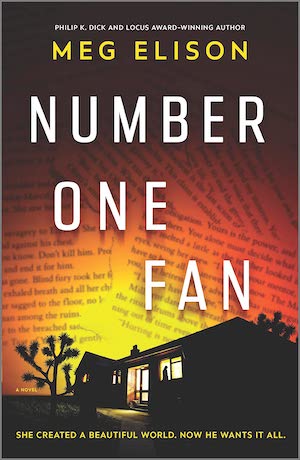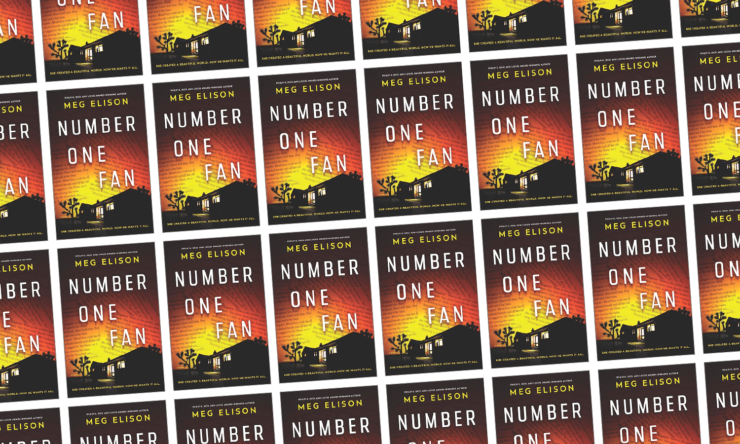One of the most unforgettably chilling moments in Number One Fan, Meg Elison’s gender-swapped update of Stephen King’s horror classic Misery, happens in the opening pages: Urban fantasy author Eli Grey has just gotten into a rideshare with a male driver, only to get a notification that her female driver has cancelled her ride. Rather than note that red flag, Eli automatically assumes that she must have booked two rides—whatever makes it her fault for the mixup, and not worth confronting why a strange man might have picked her up at the airport. As the ride stretches on uncomfortably, Eli twists herself into mental knots justifying her mistake rather than looking for any malevolent intent. And then she gets roofied and wakes up in the basement of—you guessed it—her number one fan.
That is, unfortunately, exactly how a woman might react in a dangerous situation, socialized as we are to disregard our own intuitions (doubly so in horror). Amplify that with being an author; as Elison said in a recent interview, “Artists are supposed to be temperamental, but authors on tour are creatures of shambling gratitude and absolute discipline.” Such keen insights come from Elison’s decade-long career as a published author; but before that, she was a fanfiction writer and cultural critic, so she also understands how much personal investment that readers and other professionals on the fringes of the industry put into their favorite works. Eli in the Uber is entrusting her safety to a stranger, but little does she realize the extent to which her fans have placed their own trust in her, despite not knowing her at all, to make them feel seen in her creations. Those claims—on her worlds, on her characters, on her—can oh-so-easily slide sideways into toxic entitlement.
Number One Fan interrogates this push-and-pull dynamic within the contexts of social media and the last two decades of SFF publishing and fandom; it throws Misery, Harry Potter, Seanan McGuire, Brandon Sanderson, Wheel of Time, fanfic, the Hugo Awards (including the 2015 slate), and more into a bag and shakes it. The details and mashups that emerge provide the texture for the horrific ordeal between Eli, chained to a bed in a basement with a camera tracking her every move; and Leonard, who employs torture tactics like sleep deprivation in an attempt to break down the author. But the atrocity doesn’t stop at the level of Annie Wilkes forcing Paul Sheldon to burn his manuscript and write a new ending for Misery Chastain; Leonard not only wants to own the magic-wielding heroine Millicent Michaelson, but he also wants to possess Eli Grey herself.
Buy the Book


Number One Fan
Elison (winner of the 2015 Philip K. Dick award for Book of the Unnamed Midwife) is an astute, cuttingly clever writer whose SFF short fiction includes the gorgeous Locus Award-winning novelette “The Pill” and the bleak yet hopeful story “Dresses Like White Elephants.” However, that cleverness is in limited supply here in a book whose plot relies less on inventive worldbuilding in a limited space and more on inside-baseball knowledge of the last few years’ controversies in the genre. In this case, hitting SFF bingo feels more exhausting than celebratory.
Bouncing between Eli’s present imprisonment and flashbacks from both perspectives, Elison traces how seemingly innocuous tweets and brief interactions at conventions slowly erode the barriers between creator and fan. Leonard is clearly disturbed, though it’s unclear if any blame can be put on a traumatic background (it’s only shallowly hinted at), or if he were always going to treat women as fantasy objects rather than actual, imperfect people. (Content warning for rape and other violence against people with vaginas.) Despite Leonard radiating low-grade creepiness from the start, he gains just enough access to the SFF publishing world to build up his own narrative of both writer and victim, depending on the circumstances. A late-stage reveal of key information even engenders a brief, curious sympathy for Leonard’s career stumbles, but it’s presented too late in the game to at all balance his torture of Eli.
Speaking of—where it comes to gender and to torture, Elison nails every gruesome point. She inverts the novel’s setting, replacing Misery’s icy Colorado with the brutal California desert, without losing the sense of utter remoteness and disconnection from the outside world. For a protagonist like Eli, who has few friends aside from fellow author Nella and personal assistant Joe, it’s shockingly easy to be cut off despite living with our phones nearly surgically attached to our hands. The meticulous consideration that Elison brought to the speculative thought experiment of “The Pill” means that Number One Fan accounts for every single uncomfortable detail of imprisoning a cis woman, including a persistent yeast infection and how her body reacts to being alternately drugged and starved.
The multiple perspectives provide Elison ample opportunity to really examine this scenario from all sides outside of Leonard’s prison, with supporting characters operating on their worst impulses: The female FBI agent brought on to this missing persons case suspects Joe just enough that she juggles following his hunches with doing her own background check on him—each delay further weakening Eli’s chances of getting outside help. Even those closest to Eli doubt that she’s in what feels like a melodramatic amount of danger, due in part to how unapologetically she keeps everyone at arm’s length. Maybe some of them even want to see her suffer a little. It’s the kind of unflinching honesty that Elison excels at.
Number One Fan is a discomfiting read from its first unsettling moments to its final, violent catharsis. Some of the pop cultural touchstones and Easter eggs in the middle could have been excised without changing the emotional core of the story, which is a thorough examination of the greater demands made on female creators even in gender-swapping a well-known story of fan entitlement. By the end of Misery, Paul winds up writing the best book of his career due in part to Annie’s challenges. By contrast, Eli doesn’t need to change for Leonard. She breaks, certainly, but she breaks for herself, not for him or for anyone else. From Elison, I would expect no less.
Number One Fan is published by MIRA.
Natalie Zutter‘s personal favorite riff on Misery was when comedian Miel Bredouw retold the plot of the movie to the tune of Paramore’s “Misery Business” on Punch Up the Jam. Talk pop culture retellings with her on Twitter!










